Play began on February 6 with Czechoslovakia defeating the United States 5-1, Canada downing West Germany 6-1 and the Soviet Union dominating Finland 8-0 to continue their unbeaten streak which dated back to March 10, 1963.
The Soviets had lost to Sweden 2-1 in the second game of the 1963 World Championships, but then won their final five games by a combined score of 43-6 to win their first of five consecutive World Championships leading up to the 1968 Games in Grenoble, which included the 1964 Olympics, which counted as that year's World Championships, as did the 1968 Games in France.
The Soviets won again 9-0 over East Germany the next day as Anatoli Firsov led them with three goals, while the Czechs kept pace with a 5-1 victory over West Germany on the 8th. February 9 saw the United States fall to the Soviets 10-2 as Firsov scored his second consecutive hat trick and the Czechs outlasted Finland 4-3 on the 10th.
The Soviets moved to 4-0 following an easy 9-1 win over West Germany and again the Czech answered with their own 10-3 triumph over the East Germans.
The dominating Soviets winning streak now reached 39 games with a narrow 3-2 win over the Swedes on February 13. Meanwhile, the Czechs fell behind 3-0 to Canada after two periods and, while they got to within 3-2, they could not find the equalizer and fell to the Canadians, perhaps looking forward to their next game with the Soviets.
That game arrived on February 15th and saw the Czech streak out to an unexpected 3-1 lead after one period, but there was still plenty of time for the Soviets to stage a comeback. Another 20 minutes passed with each team scoring once. While the Soviets did score twice, the Czechs got the goal they needed to preserve a 5-4 win, ending the Soviets winning streak less than a month shy of five years.
Of note, on this date in 1968, East Germany faced off against West Germany for the first and only time at the Olympics, as during the previous three Games, the two countries were represented by a single team known as the "Unified Team of Germany". For their 1968 face off, the West Germans prevailed 4-2 for their only win of the tournament, keeping the East Germans winless at 0-7.
But there was still the matter of the medals to determine. Not only did the Soviet Union and Czechoslovakia enter the final day of competition with a 5-1 record, Canada had also kept pace over the course of the tournament with a 5-1 record of their own, defeating the Czechs and only losing in their second game to Finland.
Czechoslovakia would win to take gold even if the Soviet Union beat Canada, as the Czechs held the tiebreaker over the Soviets thanks to their head-to-head victory. However, if the Canadians were to defeat the Soviets, they in turn held the advantage over the Czechs! However, the tiebreakers were all rendered useless when the Czechs allowed the Swedes to score a third period goal for a 2-2 tie leaving the final game as a winner take all affair.
The loss dropped Canada to a 5-2 record and the bronze medal while the Czechs were awarded the silver with a record of 5-1-1.
This would be the final Olympics for the Canadians until 1980, as a dispute about the rules of amateurism led to them withdrawing from international competition from 1970 to 1976, causing them to miss the Games in both 1972 and 1976 as well as all the World Championships during that time period, including the 1970 Worlds, which they were scheduled to host for the first time ever.
Today's featured jersey is a 1968 Soviet Union National Team Anatoli Firsov jersey as worn during the 1968 Winter Olympics in Grenoble, France as the Soviet Union won their third gold medal in four tries and second consecutive. The Soviet Union first began wearing this basic, utilitarian style jersey as far back as 1964 and it would remain in use through the 1976 Olympics.
Firsov was a dominant force, leading the combined World Championships and Olympics in scoring four times (1967, 1968, 1969 and 1971) and was the MVP of the Soviet League three times, 1968, 1969 and 1971, and it's scoring champion in 1966. He would eventually win three Olympic gold medals, those coming in 1964, 1968 and 1972.
Today's first video are highlights of the Czechs defeating the Soviets to end their five year long winning streak. Note the clear boards used in Grenoble!
Next, is a clip of the final game of the 1968 Olympics to decide the gold medal between the Soviet Union and Canada, as Firsov opens the scoring while the Soviets are shorthanded.

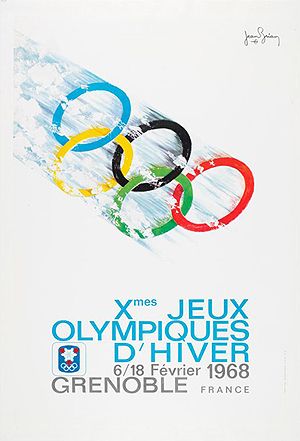
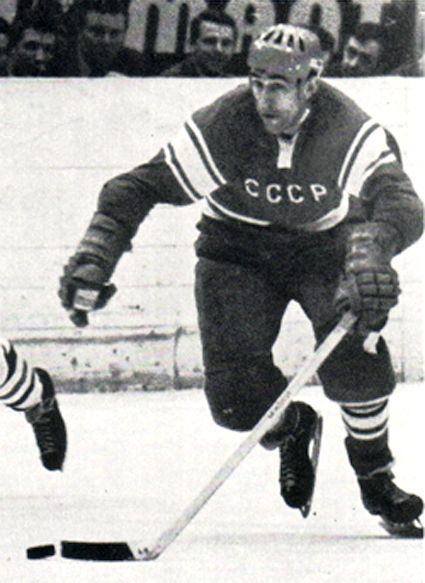
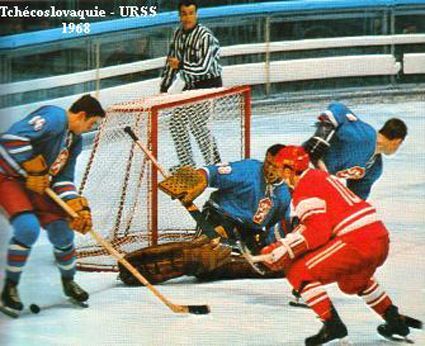
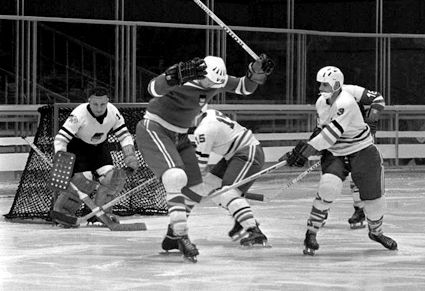
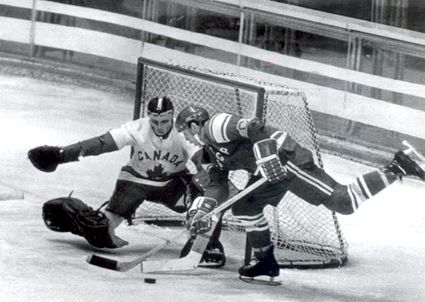
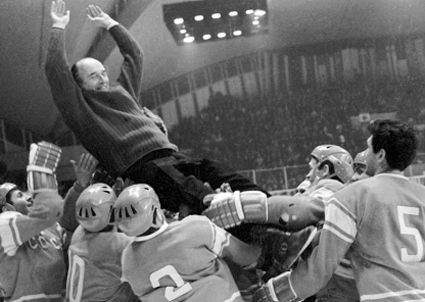
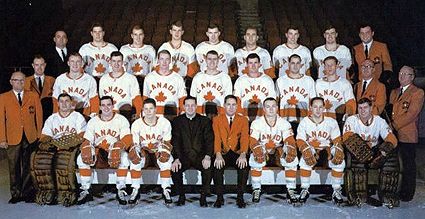
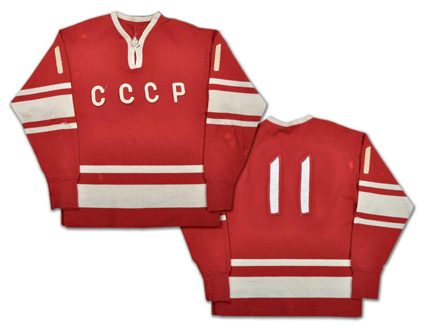










No comments:
Post a Comment
We welcome and encourage genuine comments and corrections from our readers. Please no spam. It will not be approved and never seen.